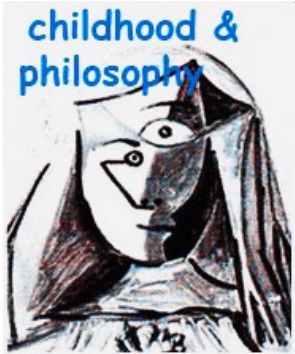como gerar (educar) uma comunidade de investigação-jazzing: sugestões livres e abertas de um workshop internacional (ICPIC 2022)
DOI:
https://doi.org/10.12957/childphilo.2023.70680Palavras-chave:
pedagojazz, jazzing, investigação, fpcc, performanceResumo
Este texto apresenta a reflexão coletiva e todas as sugestões emergentes da comunidade de investigação (CdI) temporária criada durante um workshop internacional na XX Conferência Bienal do ICPIC, “Filosofia dentro e fora da sala de aula”: fpcc através das diferenças culturais, sociais e políticas”. O workshop, intitulado “Pedagojazz – improvisando e investigando, interação comunitária”, foi realizado via Zoom, mas os participantes estavam tanto online quanto presentes pessoalmente. O tópico focou a perspectiva pedagojazzística e as curtas atividades propostas visavam envolver a CdI (temporária) dos participantes em uma discussão coletiva sobre como seria possível educar uma comunidade de perguntas e transformá-la em uma comunidade de perguntas-jazzing. Três premissas foram introduzidas como um fundo comum para desenvolver nossas reflexões: a perspectiva pedagojazzística; a conexão já desenvolvida entre os idiomas pedagojazz e os diferentes papéis do facilitador na fpcc; e a ideia de que o jazz, e particularmente a improvisação coletiva, podem informar o desenvolvimento da CdI. As perspectivas do pedagojazz e da improvisação coletiva são apresentadas aqui, e os conceitos relacionados são descritos em detalhes. Durante a oficina, o chat do Zoom e o site Wooclap foram usados para envolver todos os participantes e reunir suas contribuições e sugestões. Uma nuvem de palavras e três tabelas foram produzidas e são apresentadas aqui. Surgiram solicitações e perspectivas interessantes que podem nos ajudar a refletir de uma forma mais complexa sobre a educação fpcc da comunidade e dos facilitadores através das diferenças culturais, sociais e políticas.Referências
Attali, J. (1985). Noise: The political economy of music. University of Minnesota Press.
Barrett, F. (2012). Yes to the mess: Surprising leadership lessons from jazz. Harvard Business Review Press.
Bourdieu, P. (1992). Risposte. Per un’antropologia riflessiva. Bollati Boringhieri.
D’Olimpio, L., & Teschers, C. (2015). Playing with philosophy: Gestures, performance, P4C and an art of living. Conference for the Philosophy of Education Society of Australasia (PESA).
Demozzi, S., & Ilardo, M. (2020). Educational deontology in the community of philosophical inquiry. childhood & philosophy, 6, 1–16. doi: 10.12957/childphilo.2020.45955
Dewitt, Z., & Kingan, E. (2021). Forum theatre meets philosophy for/with children: Physically exploring challenging situations in the community of philosophical inquiry. childhood & philosophy, 17, 1–25. doi: 10.12957/childphilo.2021.53904
Echeverria, H. & Hannam, P. (2017). The community of philosophical inquiry (p4c) – a pedagogical proposal for advancing democracy. In M. R. Gregory, J. Haynes, & K. Murris (Eds.). The Routledge International Handbook of Philosophy for Children (pp. 3–10). Routledge.
Fischlin, D.; Heble, A. & Lipsitz, G. (2013). The fierce urgency of now: Improvisation, rights and the ethics of cocreation. Duke University Press.
Gould, S. J., & Vrba, E. S. (1982). Exaptation – a missing term in the science of form. Paleobiology, 8(1), 4–15.
Gregory, M. R., & Laverty, M. J. (2018). In community of inquiry with Ann Margaret Sharp. Childhood, philosophy and education. Routledge.
Gur-Ze’ev, I. (2010). Diasporic philosophy and counter-education. Sense.
Hamilton, A., & Konitz, L. (2007). Conversation on the improviser’s art. University of Michigan Press.
Kennedy, D. (2004). The role of a facilitator in a community of philosophical inquiry. Metaphilosophy, 35(5), 744–765.
Kennedy, D., & Kohan, W. (2021). some ethical implications of practicing philosophy with children and adults. childhood & philosophy, 17, 1–16. doi: 10.12957/childphilo.2021.61025
Kizel, A. (2016). Philosophy with children as an educational platform for self-determined learning. Cogent Education, 3(1), 1–11.
Kizel, A. (2021). the facilitator as self-liberator and enabler: ethical responsibility in communities of philosophical inquiry. childhood & philosophy, 17, 1–20. doi: 10.12957/childphilo.2021.53450
Kohan, W., Santi, M., & Wozniak, W. (2017). Philosophy for teachers: Between ignorance, invention, and improvisation. In M. R. Gregory, J. Haynes, & K. Murris (Eds.). The Routledge International Handbook of Philosophy for Children (pp. 253–259). Routledge.
Lipman, M. (1995). Moral education higher-order thinking and philosophy for children. Amsterdam: Early Child Development and Care, 107, 61–70.
Lipman, M. (2003). Thinking in education, 2nd ed. Cambridge University Press.
Preston-Roedder, E. (2020). What can philosophy learn from improvisational theatre? Precollege Philosophy and Public Practice, 2, 18–35.
Santi, M. (2016). Education as jazz: A framework to escape the monologue of teaching and learning. In M. Santi, E. Zorzi (Eds.) Education as jazz. Interdisciplinary sketches on a new metaphor (pp. 3–27). Cambridge Scholars.
Santi, M. (2017). Jazzing philosophy with children: An improvisational path for a new pedagogy. childhood & philosophy, 13(28), 631–647. doi: 10.12957/childphilo.2017.30038
Sawyer, K. (Ed.) (2011). Structure and improvisation in creative teaching. Cambridge University Press.
Scott, T. (2007). The pedagogical imperative of musical improvisation. Critical Studies in Improvisation, 3(2), 1–12.
Sharp, A. M. (1991). The community of inquiry: Education for democracy. Thinking in Education, The Journal of Philosophy for Children, 9(2), 31–37.
Small, C. (1987). Music of the common tongue. Wesleyan UP.
Taleb, N. (2012). Antifragile: Things that gain from disorder. Random House.
WHO (2001). International classification of functioning, disability and health http://apps.who.int/iris/bitstream/handle/10665/42407/9241545429.pdf;jsessionid=39B462609A921B87C2657909578FB3E1?sequence=1.
Woods, P. J. (2022). The collaborative pedagogies of solo improvisation: Learning through performance in noise music. Critical Studies in Improvisation, 15(11), 1–12.
Zorzi, E., & Santi, M. (2020). Improvising inquiry in the community: The teacher’s profile. childhood & philosophy, 16, 1–17. doi: 10.12957/childphilo.2020.46692




